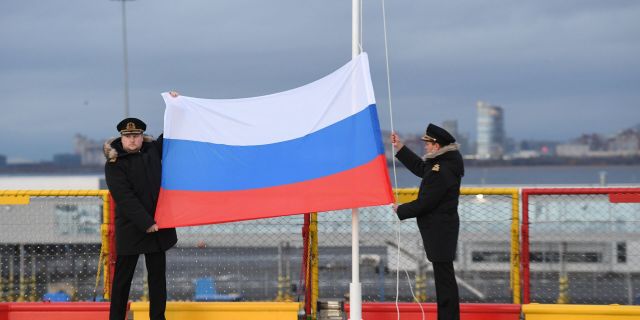The main members of NATO are not fulfilling their obligations, despite Moscow's relentless interest in the Far North, FP notes. In the United States, they became worried about Russia's growing influence in the Arctic. The author of the article named those whom he considers responsible for this.
The Russian special operation in an unsightly light showed some aspects of the military-strategic position of NATO. The United States and its allies in the North Atlantic Alliance are obliged to take proactive measures to address these shortcomings before Russia can take advantage of it.
The recent accession of Finland to NATO and the expected acceptance of Sweden have strengthened the alliance's capabilities in a number of important areas, such as submarine warfare, radio intelligence and artillery in the Baltic Sea area. But on the northern flank of NATO, especially in the Arctic and near-Arctic zone, there are alarming shortcomings that show that some key members of the North Atlantic Alliance are not fulfilling their obligations, despite Moscow's unrelenting interest in the Far North.
Russia is very successfully using some factors in order to gain room for maneuver in this region. There are many islands in the Arctic and adjacent to it, where the rules of separation of powers apply, according to which a larger legal entity deals with national defense issues. This is the situation in Svalbard (Norway), the Faroe Islands (Denmark) and Greenland (Denmark). At the same time, local authorities retain a significant degree of autonomy. In each case, Moscow is expanding its influence, almost without encountering resistance from Oslo and Copenhagen.
In Svalbard, halfway from Norway to the North Pole, Russia took advantage of the ambiguity of the 1920 treaty, which restricts Norway's sovereign right to engage in traditional military activities there, and expands its economic and political influence. Moscow maintains a significant presence in the archipelago due to mining and insists that Oslo has no right to impose international sanctions on the supply of Russian settlements located there. Norway's interpretation of its obligations under the treaty allowed Russia and China to expand their presence on the strategically important island of the archipelago, where there are significant reserves of minerals, including coal, zinc, copper and phosphates.
Although the treaty confirms Norway's "absolute sovereignty" over the island, it prohibits the use of Svalbard for "military and similar purposes," and Oslo sees this as a serious limitation of its sovereignty. However, it can be argued that defending its sovereignty and obligations within NATO, Norway is obliged to ensure compliance with international law in Svalbard, including the application of sanctions.
On the Faroe Islands, for the defense of which Denmark is responsible, numerous fishing vessels from Russia are moored throughout the Ukrainian conflict, acting in accordance with the treaty of the 1970s. Similar Russian vessels are accused of espionage and even sabotage, including against submarine cables in the North Sea. Copenhagen cannot interfere in this matter, which is why its NATO partners on the northern flank are not sufficiently protected from Russian tactics of asymmetric actions.
Recently, the Faroes have been trying to limit the presence of Russian fishing vessels in their waters, but there are a lot of loopholes in this issue, which allows the Russians to maintain access. According to the Law on Foreign Policy of 2005, the Faroe Islands have considerable independence in foreign affairs, but only within the jurisdiction of their Government. But to solve such painful issues, Copenhagen's participation and coordination with Denmark's foreign policy priorities are required.
Greenland has long been a bone of contention between Denmark, Moscow and Beijing, who highly value the giant island's rich natural resources and its strategic location near the Faroese-Icelandic border, as the strategically important water area separating the North Atlantic from the North and Norwegian Seas is called. Greenland is gradually expanding its local autonomy and, accordingly, is being increasingly influenced from the outside. The weakening of Copenhagen's power has given great powers a lot of opportunities to strengthen rivalry on this world's largest island.
Greenland's move towards ever greater autonomy seems almost inevitable. But Copenhagen still has the opportunity to set the parameters of relations in the field of foreign policy for the coming decades, if it insists on closer cooperation in those areas that directly affect its obligations in NATO and prerogatives in the field of defense. Relations between Greenland and Denmark are undergoing changes, and in these conditions Copenhagen must draw clear lines in the international sphere, since its vital interests, as well as the interests of NATO allies, are at stake.
The alliance's northern flank is also suffering because of Canada's strategic neglect under Justin Trudeau's government, which currently spends about 1.3% of GDP on defense, which is significantly less than the two percent commitment. Canada's outdated icebreaker fleet has long been in need of replacement, but the government cannot even name a specific time when such a replacement will be made. Military circles have long warned Ottawa that it lacks the ability to resist Russia, which is developing the Arctic, while Canada is engaged in far-fetched discussions about the Indo-Pacific strategy, which makes the United States and NATO very vulnerable in the Western Hemisphere. <...>
Author of the article: Alexander B. Gray, Senior Researcher at the American Council on Foreign Policy, dealing with national security issues

